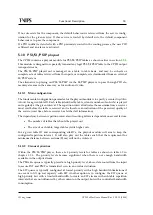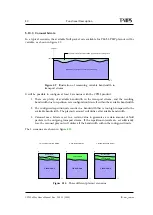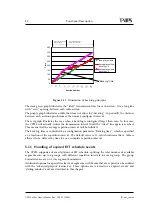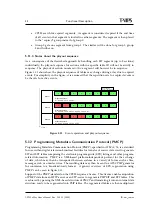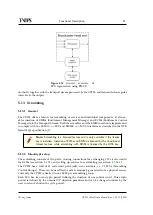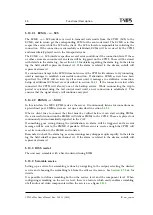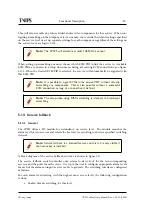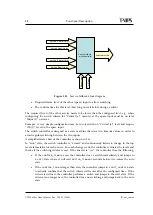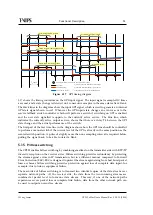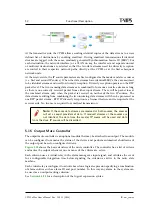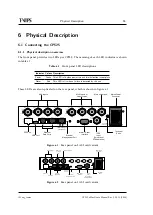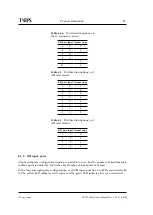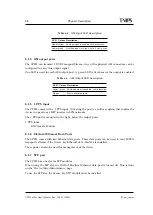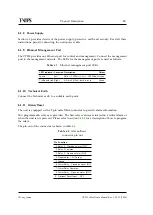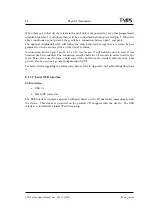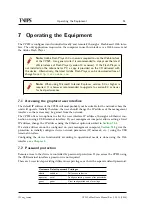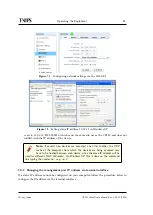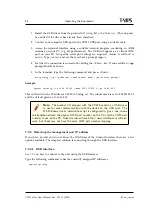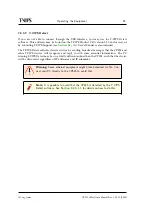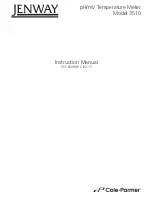
52
Functional Description
CP525 cMux User’s Manual Rev. 5.20.12 (3944)
ID: um_tsmux
At the transmitter side, the CP525 allows sending identical copies of the data stream to a user
defined list of destinations by enabling smallcast. During smallcast transmission all identical
streams are tagged with the same, randomly generated Synchronization Source ID (SSRC). For
each destination, the network interface (or a VLAN on any the interfaces) and separate unicast
or multicast destinations are selected so that the two data streams used for diversity reception
are routed to their respective network paths directly at the CP525 or at the first sebsequent
network node.
At the receiver side, the IP source parameters are first configured as the master and slave sources
(i.e. first and second IP source). When the data streams have identical SSRCs, they are assumed
to be identical streams and used for diversity reception. Diversity reception operates on the RTP
packet level. The two incoming data streams are combined to form one error free stream as long
as there is one correctly received packet from either input stream. There will be packet loss at
the combined stream only when the packet is received on neither of the two IP sources. The
data stream resulting from combining the two incoming data streams will then be processed as
one RTP packet stream. RTP/IP diversity reception is a licensed feature and is required at the
receiver side. No licence is required for smallcast transmission.
Note:
If the same data streams are received at both sources, the sources
will act as equal providers of data. If received streams at the sources are
not identical, the data from the master IP source will be used and data
from the slave IP source will be discarded.
5.16 Output Mute Controller
The output mute controller is an optional module that may be attached to an output. The module
can be configured to monitor the status of the device and perform automatical shutdowns of
the output port based on configured criteria.
shows the basic structure of the mute controller. The controller has a list of criteria
and mutes the output whenever one or more of the criteria are active.
Each criterion uses a virtual relay in the alarm manager as input signal, and validates the event
for a configurable integration time before signaling the criterion as active to the mute state
machine.
Each virtual relay is configured to activate based on a logical expression specifying a combination
of alarm entities such as alarm ID and port number. In this way any alarm in the system can
be used as an output muting criterion.
See
for a description of the logical expression syntax.
Summary of Contents for CP525 cMux
Page 2: ......
Page 10: ......
Page 12: ...12 CP525 cMux User s Manual Rev 5 20 12 3944 ID um_tsmux ...
Page 18: ...18 CP525 cMux User s Manual Rev 5 20 12 3944 ID um_tsmux ...
Page 24: ...24 CP525 cMux User s Manual Rev 5 20 12 3944 ID um_tsmux ...
Page 66: ...66 CP525 cMux User s Manual Rev 5 20 12 3944 ID um_tsmux ...
Page 238: ...238 CP525 cMux User s Manual Rev 5 20 12 3944 ID um_tsmux ...
Page 248: ...248 CP525 cMux User s Manual Rev 5 20 12 3944 ID um_tsmux ...
Page 276: ...276 CP525 cMux User s Manual Rev 5 20 12 3944 ID um_tsmux ...


